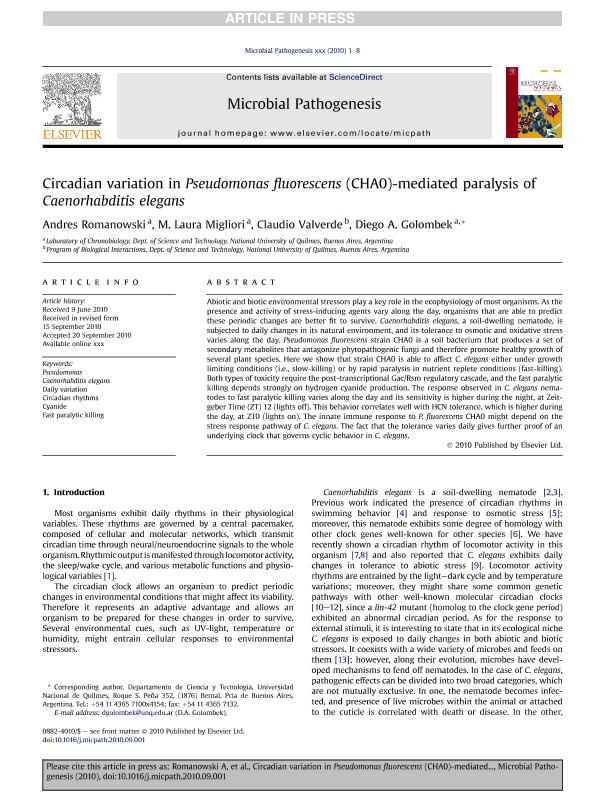Artículo
Circadian variation in Pseudomonas fluorescens (CHA0)-mediated paralysis of Caenorhabditis elegans
Fecha de publicación:
01/2011
Editorial:
Academic Press Ltd - Elsevier Science Ltd
Revista:
Microbial Pathogenesis
ISSN:
0882-4010
Idioma:
Inglés
Tipo de recurso:
Artículo publicado
Clasificación temática:
Resumen
Abiotic and biotic environmental stressors play a key role in the ecophysiology of most organisms. As the presence and activity of stress-inducing agents vary along the day, organisms that are able to predict these periodic changes are better fit to survive. Caenorhabditis elegans, a soil-dwelling nematode, is subjected to daily changes in its natural environment, and its tolerance to osmotic and oxidative stress varies along the day. Pseudomonas fluorescens strain CHA0 is a soil bacterium that produces a set of secondary metabolites that antagonize phytopathogenic fungi and therefore promote healthy growth of several plant species. Here we show that strain CHA0 is able to affect C. elegans either under growth limiting conditions (i.e., slow-killing) or by rapid paralysis in nutrient replete conditions (fast-killing). Both types of toxicity require the post-transcriptional Gac/Rsm regulatory cascade, and the fast paralytic killing depends strongly on hydrogen cyanide production. The response observed in C. elegans nematodes to fast paralytic killing varies along the day and its sensitivity is higher during the night, at Zeitgeber Time (ZT) 12 (lights off). This behavior correlates well with HCN tolerance, which is higher during the day, at ZT0 (lights on). The innate immune response to P. fluorescens CHA0 might depend on the stress response pathway of C. elegans. The fact that the tolerance varies daily gives further proof of an underlying clock that governs cyclic behavior in C. elegans. © 2010 Elsevier Ltd.
Archivos asociados
Licencia
Identificadores
Colecciones
Articulos(SEDE CENTRAL)
Articulos de SEDE CENTRAL
Articulos de SEDE CENTRAL
Citación
Romanowski, Andrés; Migliori, María Laura; Valverde, Claudio Fabián; Golombek, Diego Andrés; Circadian variation in Pseudomonas fluorescens (CHA0)-mediated paralysis of Caenorhabditis elegans; Academic Press Ltd - Elsevier Science Ltd; Microbial Pathogenesis; 50; 1; 1-2011; 23-30
Compartir
Altmétricas




